Trauma, Healing, and the Vietnam War
In The Women, Frankie and countless other characters experience significant traumatic events, primarily as a result of the Vietnam War. While in Vietnam, Frankie learns to deal with the daily violence and horror by repressing her fear and focusing on what she can do to alleviate suffering in her capacity as a nurse. When she returns stateside, however, these traumatic experiences resurface in the form of nightmares, rapid mood swings, and vivid flashbacks. Afraid…
read analysis of Trauma, Healing, and the Vietnam WarWomen’s Experiences and Solidarity
The Women explores the unique experiences and perspectives of women who lived during and served in the Vietnam War. From the moment she volunteers for the Army Nurse Corps, it is evident that Frankie has chosen an unconventional path for a young woman of her generation. Her parents are appalled by her decision, and Frankie herself has little knowledge of what she’s signed up for. In Vietnam, Frankie undergoes enormous personal growth, realizing she is…
read analysis of Women’s Experiences and SolidarityHeroism, Honor, and Sacrifice
In The Women, Frankie proudly joins the Army Nurse Corps in part because she was raised on her father’s stories of male family members who honorably served America in times of war. Thanks to his stories, Frankie begins the novel possessed by a spirit of patriotism and a desire to serve and be a hero. She envies the way her parents praise her brother Finley for going to Vietnam and hopes that serving…
read analysis of Heroism, Honor, and Sacrifice
Propaganda vs. Truth
By highlighting the discrepancies between Frankie’s experiences in Vietnam and American perception of the war, The Women investigates the role of government propaganda in bolstering the myth of American superiority. Like many Americans, Frankie initially views the war as a patriotic effort to spread democracy abroad and stop the spread of communism. Finley’s going-away party is evidence of wartime optimism, suggesting no one doubts that the U.S. will be victorious. But when Frankie…
read analysis of Propaganda vs. TruthShame, Pride, and Moral Ambiguity
The Women critiques binary notions of morality and embraces the concept of moral ambiguity. The controversy surrounding the Vietnam War and the civil unrest of the 1960s and 1970s illustrate a significant shift in America’s political landscape, in which the ethical concepts of right and wrong are no longer clear-cut. During this period, social progressivism upended long-held conservative perceptions of sex, recreational drug use, and racial injustice. Additionally, the public became more critical of military…
read analysis of Shame, Pride, and Moral Ambiguity






